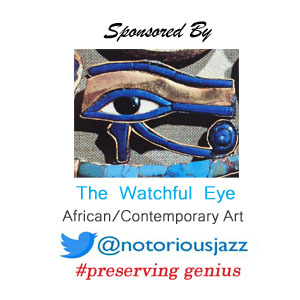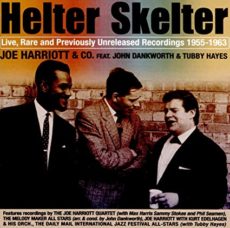
Daily Dose Of Jazz…
Joseph Arthurlin Harriott was born in Kingston, Jamaica on July 15, 1928. Harriott was educated at Alpha Boys School, an orphanage in the city where he learned to play the clarinet, the instrument that was assigned to him shortly before his tenth birthday. He took up the baritone and tenor saxophone while performing with local dance bands before settling on the alto saxophone.
Moving to London, England as a working musician in the summer of 1951 at the age of 23 as a member of Ossie Da Costa’s band, he initially began as a bebopper, and also became a pioneer of free-form jazz. Harriott was part of a wave of Caribbean jazz musicians who arrived in Britain during the 1950s, including Dizzy Reece, Harold McNair, Harry Beckett and Wilton Gaynair.
Deeply influenced by Charlie Parker, he developed a style that fused Parker with his own Jamaican musical sensibility, most notably the mento and calypso music he grew up with. During the 1950s, he had two long spells with drummer Tony Kinsey’s band, punctuated by the membership of Ronnie Scott’s short-lived big band, occasional spells leading his own quartet and working in the quartets of drummers Phil Seamen and Allan Ganley.
Harriott began recording under his own name in 1954, releasing a handful of E.P. records for Columbia, Pye/Nixa and Melodisc throughout the 1950s. However, the majority of his 1950s recordings were as a sideman with the musicians previously mentioned, also backing a diverse array of performers, from mainstream vocalist Lita Roza to traditional trombonist George Chisholm to the West African sounds of Buddy Pipp’s Highlifers. Harriott also appeared alongside visiting American musicians during this period, including a “guest artist” slot on the Modern Jazz Quartet’s 1959 UK tour.
Forming his own quintet in 1958, Joe’s hard-swinging bebop was noticed in the United States, leading to the release of the Southern Horizons and Free Form albums on the Jazzland label. By now firmly established as a bebop soloist, in 1960 Harriott turned to what he termed “abstract” or “free-form” music. During the late 1960s he and violinist John Mayer developed Indo-Jazz Fusion – an early attempt at building on music from diverse traditions. His work in 1969 was to be the last substantial performance of his career.
While he continued to play around Britain wherever he was welcome, no further recording opportunities arose. He was virtually destitute in his last years and ravaged by illness. Alto saxophonist and composer Joe Harriott passed away from cancer on January 2, 1973.

More Posts: bandleader,composer,history,instrumental,jazz,music,saxophone
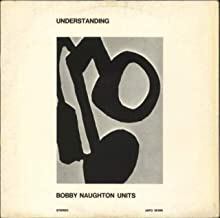
Daily Dose Of Jazz…
Robert Naughton was born on June 25, 1944 in Boston, Massachusetts. He studied piano from the age of seven through his teens, playing in rock bands and lounge bands.
After serving in the U.S. Army, Naughton started playing organ with a blues band. Following this period he studied painting in art school, then in the 1960s vibraphone became his instrument in the 1960s he was accompanying Sheila Jordan and Perry Robinson.
In 1969 Bobby recorded for the first time, releasing music on his label, Otic, and five more through 2002 as a leader. He composed the score for the silent film Everyday by German artist Hans Richter. In 1972 he played in the Jazz Composers Orchestra. Beginning a year later working with Wadada Leo Smith he recorded several albums through the 1980s. From 1978 to 1982 he toured and recorded with Anthony Braxton, Roscoe Mitchell, the Creative Music Orchestra, and the Creative Improvisers Orchestra.
Vibraphonist Bobby Naughton, who plays fluently with four sticks, exploits the instrument’s overtones and sometimes controls manually the instrument’s vanes continues to perform and record.
More Posts: bandleader,history,instrumental,jazz,music,organ,piano,vibraphone
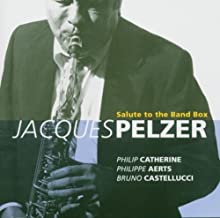
Daily Dose Of Jazz…
Jacques Pelzer was born in Liège, Belgium on June 24, 1924, and got his inspiration from Benny Carter, then Charlie Parker and Lee Koni. His first exposure to jazz was after World War II when he joined the Bob Shots, a legendary Belgian bop band that included at various time pioneers such as Bobby Jaspar, René Thomas, and Sadi. He also played with other historical figures of Belgian jazz such as pianist/arranger Francy Boland, guitar and harmonica player Toots Thielemans, bassist Benoît Quersin. His work with René Thomas continued for several years, leading to several recordings.
Pelzer’s evolution in the Sixties and Seventies included free jazz and fusion, recorded the soundtrack of the film “Le Départ” with Don Chery, Philip Catherine, and Gato Barbieri. He had three tours of the United States with Chet Baker, resulting in a lasting friendship and musical partnership and ultimately met Dexter Gordon, Archie Shepp, Stan Getz, Lee Konitz, Philly Joe Jones and Bill Evans.
The next two decades saw Jacques returning to straight-ahead jazz, acoustic jazz, and bebop standards, modern compositions with an accent on lyricism and expression. Moving back to the studios in 1990 to record his CD Never Let Me Go with his band the Open Sky Unit along with Barney Wilen, Michel Graillier, Eric Legnini as guests. This recording received the Sax Prize for best jazz album of the year 1991.
Three magnificent Belgian jazz musicians, guitarist Philip Catherine, bassist Philippe Aerts, and drummer Bruno Castellucci joined for his final album Salute To The Bandbox. Alto and soprano saxophonist and flutist Jacques Pelzer passed away on August 6, 1994 in his hometown.
More Posts: bandleader,history,instrumental,jazz,music
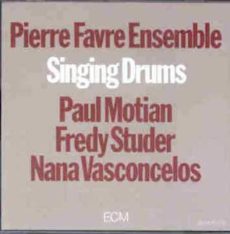
Daily Dose Of Jazz…
Pierre Favre was born June 2, 1937 in Le Locle, Switzerland and originally was a self-taught drummer. He went on to study classical composition and immersed himself in the diverse percussion music of the wider world, particularly those of India, Africa, and Brazil. Gradually he consolidated all of this new information in the “sound-color poems” he was writing for his Singing Drums group.
He recorded the album Singing Drums for ECM in 1984 with Paul Motian, Fredy Studer, and Nana Vasconcelos. Over the course of his career, Pierre has recorded twenty-nine as a sideman working with John Surman, Tamia, Michel Godard, Mal Waldron, Paul Giger, Jiří Stivín, Michel Portal, Samuel Blaser, the ARTE Quartett, Barre Phillips, Irene Schweizer, Philipp Schaufelberger, Manfred Schoof, Joe McPhee, Dino Saluzzi, London Jazz Composers Orchestra, Stefano Battaglia, Furio Di Castri, Paolo Fresu, Jon Balke, Denis Levaillant, Yang Jing, and Andrea Centazzo.
As a leader, drummer and percussionist Pierre Favre has recorded seven albums and continues to perform and record.
More Posts: bandleader,drums,history,instrumental,jazz,music
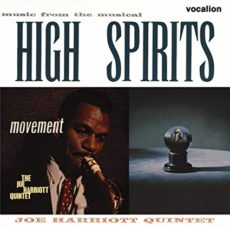
Daily Dose Of Jazz…
Shake Keane was born Ellsworth McGranahan Keane on May 30, 1927 in Kingstown, St. Vincent, West Indies into a family that loved music and books. He attended Kingstown Methodist School and St. Vincent Grammar School. He was taught to play the trumpet by his father Charles and gave his first public recital at the age of six. When he was 14 years old, Keane led a musical band made up of his brothers. In the 1940s, with his mother Dorcas working to raise six children, the teenager joined one of the island’s leading bands, Ted Lawrence and His Silvertone Orchestra.
During his early adulthood in St. Vincent, his principal interest was literature, rather than the music for which he would become better known. Dubbed “Shakespeare” by his school friends, on account of his love of prose and poetry. This nickname was subsequently shortened to “Shake”, which name he came to use throughout his adult life. He published two books of poetry in the early Fifties L’Oubili and Ixion, while still in St. Vincent.
Emigrating to Great Britain in 1952 he worked on BBC Radio’s Caribbean Voices, reading poetry and interviewing fellow writers and musicians. He also began playing the trumpet in London nightclubs, working in a number of styles including cabaret, highlife, soca, mento, calypso, and jazz. From 1959 he committed more fully to jazz, spending six years as a member of pioneering alto saxophonist Joe Harriott’s band. The group was the first in Europe and one of the first worldwide, to play free jazz, and Keane contributed mightily to the band’s artistic success, thanks to his fleet and powerful improvisatory skills on trumpet and flugelhorn.
He also made a small handful of records under his own name, but these were usually light jazz. In 1966 he left Britain to settle in Germany and became a featured soloist with the Kurt Edelhagen Radio Orchestra, and also joined the Kenny Clarke-Francy Boland Big Band.
Setting aside his musical career, he returned to St. Vincent in 1972 taking up a government position as director of culture, where he remained in the post until 1975. He then became an educator as his main profession, while continuing to write poetry. In the early 1980s, Shake moved to New York City, settling the Bedford-Stuyvesant section of Brooklyn which became his base but found a second home in Norway.
He returned full-time to music in 1989 when he rejoined Michael Garrick and his old bandmates Coleridge Goode and Bobby Orr for a tour in honor of Joe Harriott. In 1991 Keane appeared in a BBC Arena documentary with the Jamaican poet Linton Kwesi Johnson.
In the 1990s, he remained based in Brooklyn, but found a second home in Norway, where he worked most extensively. He contributed music to Norwegian television and stage productions for the next few years, also touring the country playing jazz. It was while preparing for one such tour that he became ill, and subsequently, trumpeter and poet Shake Keane passed away from stomach cancer on November 11, 1997 in Oslo, Norway.
More Posts: bandleader,flugelhorn,history,instrumental,jazz,music,trumpet


